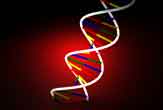New Genes as Key to Life as Old Genes

Newly evolved genes are just as crucial to life as ancient ones, according to a new study.
The discovery, published Dec. 17 in the journal Science, upends the conventional wisdom that our oldest genes are the "bread-and-butter" of life, while new genes are the less-critical "vinegar." Instead, a third of the new genes studied in fruit flies became essential to the insects within the evolutionary eye blink of a few million years.
"A new gene is as essential as any other gene; the importance of a gene is independent of its age," Manyuan Long, a professor of ecology and evolution at the University of Chicago, said in a statement, adding "We were shocked."
Long and her colleagues tested the importance of 195 fruit fly genes, blocking each gene from transcribing its instructions to make proteins or other chemicals, rendering them useless.
Of the 195 young genes tested, the loss of 59 of them (30 percent) was lethal, causing the fly to die during its development. When the same method was applied to a sample of older genes, a statistically similar figure was found: 86 of 245 genes (35 percent) were lethal when silenced.
Because the young genes tested appeared between 1 million and 35 million years ago, the data suggests that new genes with new functions can become an essential part of a species' biology much faster than previously thought. A new gene may become indispensable by forming interactions with older genes that control important functions, said study researcher Sidi Chen, University of Chicago graduate student.
"New genes come in and quickly interact with older genes, and if that interaction is favorable by helping the organism survive or reproduce better, it is favored by natural selection and stays in the genome," Chen said in a statement. "After a while, it becomes essential, and the organism literally cannot live without the gene anymore. It's something like love: You fall in love with someone and then you cannot live without them."
Sign up for the Live Science daily newsletter now
Get the world’s most fascinating discoveries delivered straight to your inbox.
The loss of many of the new genes caused flies to die during middle or late development, while the loss of older genes were fatal during early development. The findings suggest that while old genes essential for early development are shared widely among species, newer, unique genes may take over in later development. These new genes could provide the pathways that make every species different.
"I think it has important implications on human health," Chen said. "Animal models have proven to be very useful and important for dissecting human disease. But if our intuition is correct, some important health information for humans will reside in the unique parts of the human genome."
- Genetic Science Oozes Out of Amateurs' Garages
- Top 10 Things That Make Humans Special
- The Top 10 Worst Hereditary Conditions
You can follow LiveScience Senior Writer Stephanie Pappas on Twitter @sipappas










